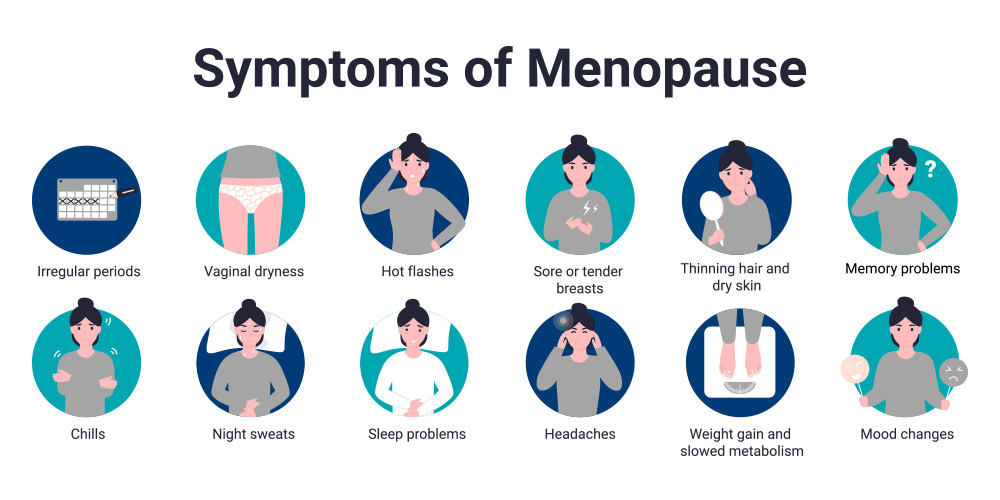Last Updated on August 26, 2024
Continue reading to understand how to take charge of your well-being and make menopause more manageable with effective menopause self care practices.
Understanding Menopause
Menopause is a natural phase in a woman’s life, signaling the end of reproductive years. In the US, it typically occurs around the age of 52. This transition involves the cessation of menstruation and the end of ovulation and fertility, largely due to an increase in estrogen and progesterone by the ovaries.
These hormonal changes can lead to a variety of emotional and physical symptoms and can bring about a range of challenges that affect daily life and overall well-being. Recognizing what’s going on helps you approach it with confidence and effective menopause self care.
The Different Stages of Menopause
Menopause consists of three distinct stages, each with its own characteristics:
Perimenopause:
This stage can start eight to ten years before menopause, typically in your 40s, as the ovaries gradually produce less estrogen. During perimenopause, you might experience symptoms such as irregular periods, hot flashes, and mood swings. Proper menopause self care can help manage these symptoms effectively.
Menopause:
Menopause is defined as the point when you have not had a menstrual period for 12 consecutive months. At this stage, your ovaries no longer release eggs and estrogen production significantly decreases. Menopause itself is a specific moment, rather than a prolonged phase. It is important to understand that effective menopause selfcare strategies can ease this transition and help manage the symptoms effectively.
Post menopause:
This stage follows menopause and lasts for the remainder of your life. Although many menopausal symptoms may subside, some women may continue to experience mild symptoms. Postmenopausal women are at higher risk for osteoporosis and heart disease due to lower estrogen levels.
Also Read: Signs Perimenopause is Ending
Symptoms of Menopause
Menopause Self-care
Nutrition: Fueling Your Body the Right Way
Proper nutrition plays a crucial role during menopause self care.
- Prioritize a balanced diet filled with fruits, vegetables, whole grains, and lean proteins to support your overall health.
- Make sure to include plenty of calcium and vitamin D in your meals to maintain strong bones and reduce the risk of osteoporosis.
- Staying mindful of portion sizes also helps in managing weight and maintaining energy levels during menopause self care.
Stay Hydrated
Hormonal changes during menopause can lead to dehydration, so it’s essential to drink plenty of water throughout the day. Staying hydrated is a key aspect of menopause self care and can help prevent symptoms like hot flashes and headaches.
Exercise: Moving for Mental and Physical Health
Staying active is another way to weather the storm of menopause. Exercise isn’t just about maintaining your weight; it’s about your overall well-being. Whether it’s walking, dancing, or yoga, find something you love and make it a part of your routine. Regular physical activity is a fundamental part of menopause self care and can help you:
- Clear those brain fog clouds and lift your mood
- Reduce menopausal symptoms such as weight gain, mood swings, and fatigue
Prioritize Sleep
Menopause can throw your sleep schedule out of whack. Tossing and turning can be frustrating. Create a calming bedtime routine as part of your menopause self care to signal your body it’s time to wind down.
- Keep the bedroom cool and dark, and limit screen time before bed.
- Consider using calming scents like lavender to help ease you into a restful sleep.
Stress Management: Keeping Calm Under Pressure
Managing stress is crucial during menopause. Incorporating stress management techniques into your menopause self-care routine can significantly improve your quality of life.
- Practice deep breathing, meditation, or read a good book that can help calm your mind.
- Find hobbies or spend time with loved ones to boost your mood. Prioritize activities that bring you joy and make you feel grounded.
Social Connections: Don’t Go Through It Alone
Isolation can creep in, but staying connected is vital. As part of menopause self care:
- Reach out to friends or join support groups.
- Talking about your feelings and experiences can help woman navigate through menopause with more ease and understanding.
Hormonal Therapy
For some woman, hormone therapy may be a suitable option to manage menopause symptoms. It’s essential to discuss this with your healthcare provider. They can help weigh the benefits and risks based on your individual needs, making it an important aspect of menopause self care.
Takeaway
In conclusion, menopause self care is all about prioritizing your well-being and taking steps to support your body and mind during this transitional phase. By focusing on nutrition, exercise, stress management, sleep, social connections, and personal rituals, you can navigate menopause with resilience and well-being and transform this period into growth and renewal Taking control of menopause through self-care is a journey of self-discovery and empowerment. It’s about embracing change and nurturing oneself through the process. By honoring and caring for our bodies, minds, and spirits, we can navigate menopause with resilience, grace, and a renewed sense of vitality. Remember, self-care is not selfish, it’s essential for living a healthy and fulfilling life during menopause and beyond.





